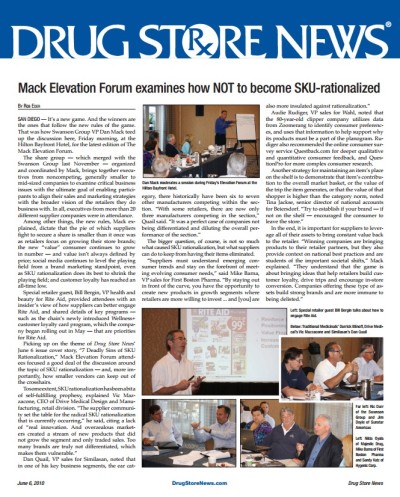SAN DIEGO — It’s a new game. And the winners are the ones that follow the new rules of the game. That was how Swanson Group VP Dan Mack teed up the discussion here, Friday morning, at the Hilton Bayfront Hotel, for the latest edition of The Mack Elevation Forum.
The share group — which merged with the Swanson Group last November — organized and coordinated by Mack, brings together executives from noncompeting, generally smaller to mid-sized companies to examine critical business issues with the ultimate goal of enabling participants to align their sales and marketing strategies with the broader vision of the retailers they do business with. In all, executives from more than 20 different supplier companies were in attendance.
Among other things, the new rules, Mack explained, dictate that the pie of which suppliers fight to secure a share is smaller than it once was as retailers focus on growing their store brands; the new “value” consumer continues to grow in number — and value isn’t always defined by price; social media continues to level the playing field from a brand marketing standpoint, even as SKU rationalization does its best to shrink the playing field; and customer loyalty has reached an all-time low.
Special retailer guest, Bill Bergin, VP health and beauty for Rite Aid, provided attendees with an insider’s view of how suppliers can better engage Rite Aid, and shared details of key programs — such as the chain’s newly introduced Wellness+ customer loyalty card program, which the company began rolling out in May — that are priorities for Rite Aid.
Picking up on the theme of Drug Store News’ June 6 issue cover story, “7 Deadly Sins of SKU Rationalization,” Mack Elevation Forum attendees focused a good deal of the discussion around the topic of SKU rationalization — and, more importantly, how smaller vendors can keep out of the crosshairs.
To some extent, SKU rationalization has been a bit a of self-fulfilling prophesy, explained Vic Mazzacone, CEO of Drive Medical Design and Manufacturing, retail division. “The supplier community set the table for the radical SKU rationalization that is currently occurring,” he said, citing a lack of “real innovation. And overzealous marketers created a stream of new products that did not grow the segment and only traded sales. Too many brands are truly not differentiated, which makes them vulnerable.”
Dan Quail, VP sales for Similasan, noted that in one of his key business segments, the ear category, there historically have been six to seven other manufacturers competing within the section. “With some retailers, there are now only three manufacturers competing in the section,” Quail said. “It was a perfect case of companies not being differentiated and diluting the overall performance of the section.”
The bigger question, of course, is not so much what caused SKU rationalization, but what suppliers can do to keep from having their items eliminated.
“Suppliers must understand emerging consumer trends and stay on the forefront of meeting evolving consumer needs,” said Mike Barna, VP sales for First Boston Pharma. “By staying out in front of the curve, you have the opportunity to create new products in growth segments where retailers are more willing to invest … and [you] are also more insulated against rationalization.”[/vc_column_text][/vc_column][/vc_row]


